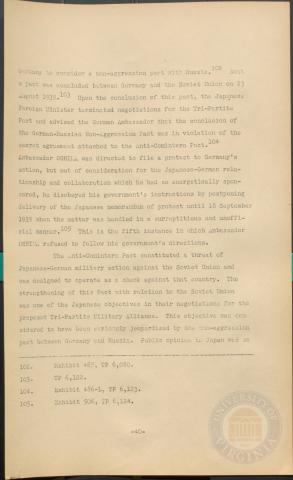
Page 40
| Parent | Japanese - German - Italian Collaboration |
|---|---|
| Date | |
| Language | English |
| Collection | Tavenner Papers & IMTFE Official Records |
| Box | Box 14 |
| Folder | Japan, Germany, Italy Collaboration and Introduction |
| Repository | University of Virginia Law Library |
Germany to consider a non-aggression pact with Russia. 102 Such a pact was concluded between Germany and the Soviet Union on 23 August 1939.103 Upon the conclusion of this pact, the Japanese
Foreign Minister terminated negotiations for the Tri-Partite
Pact and advised the German Ambassador that the conclusion of
the German-Russian Non-Aggression Pact was in violation of the
$ecret agreement attached to the Anti-Comintern Pact. 104 Ambassador OSHILA was directed to file a protest to Germany's action, but out of consideration for the Japanese-German rela¬tionship and collaboration which he had so energetically spon¬sored, he disobeyed his government's instructions by postponing delivery of the Japanese memorandum of protest until 18 September 1939 when the matter was handled in a surreptitious and unoffi¬cial manner. 105 This is the fifth instance in which Ambassador OSHIJIA refused to follow his government's directions.
The Anti-Comintern Pact constituted a threat of Japanese-German military action against the Soviet Union and was designed to operate as a check against that country. The strengthening of this Pact with relation to the Soviet Union was one of the Japanese objectives in their negotiations for the proposed Tri-Partite Military Alliance. This objective was con¬sidered to have been seriously jeopardized by the non-aggression pact between Germany and Russia. Public opinion in Japan was so
102Exhibit 48?, TP 6,080.
103TP 6,122.
104Exhibit 486-L, TP 6,123.
105Exhibit 506, TP 6,124.
